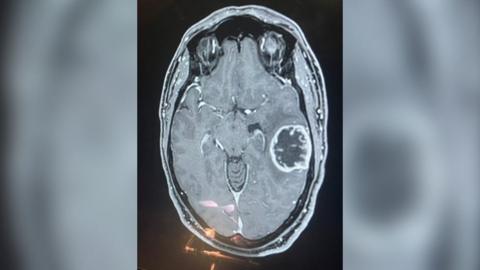Charles Trigg, who lives near Market Harborough in Leicestershire, was diagnosed with a stage four aggressive glioblastoma tumour in April.
He was told his tumour was the size of a golf ball.
The 45-year-old, who has been treated by Mr Smith, said: "To have knowledge is power and it could be the worst knowledge you have, but it gives you certainty, and having that certainty actually makes life a hell of a lot easier.
"The fact they've been able to get back data very quickly that allows an extensive team of people to conduct detailed reviews feels like an amazing blend of science and medicine.
"The pace is phenomenal, and it gives you that certainty and clarity, regardless of whether you like the information, I can't change the information, but what I can do, is take the information I've been given early - and absorb it, feel it and start to plan for the next stage."
Brain tumours are the biggest cancer killer of children and adults under 40, according to The Brain Tumour Charity.
Dr Simon Newman, the charity's chief scientific officer, said: "The delivery of an accurate diagnosis within hours of surgery will be transformative for all patients ensuring rapid access to the optimal standard of care and - crucially - removing the uncertainty patients face when having to wait weeks for their diagnosis and prognosis."
Queen Elizabeth Hospital Birmingham, Great Ormond Street Children's Hospital and King's College Hospital in London are among those now setting up their own testing of the method alongside their existing processes.
